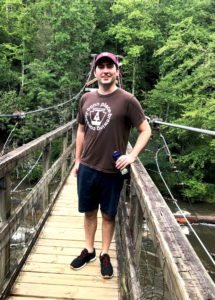
Rory Siegal, ’18, brings his academic experience at Lehigh to his job working as a quality engineer for the startup Vero Biotech. Siegal helped the startup develop a new nitric oxide delivery system that saves the lives of premature newborns. (Courtesy of Rory Siegal)
Lehigh alumni Rory Siegel, ’18, and Liam Walsh, ’17, are translating the skills gained as undergraduates to their work at Vero Biotech, where they helped develop a new Nitric Oxide delivery system that will be used to save premature newborns lives.
According to Ray Russo, the vice president of commercialization at Vero Biotech, the new system should be the first and only tankless delivery of Nitric Oxide.
“Our system is a tankless system, which is more effective, easier to use, and safer,” Russo said. “Not having tanks is really a game changer.”
Russo explained that it is more effective because it will deliver purer dosages and improve clinical outcomes. It will be safer because it will result in fewer side effects, making it more cost effective while reducing hospital costs. It will also improve patients’ lifestyles by allowing them to receive treatment without staying in their homes or the hospital.
He also said the product will help transfer data to doctors and compared its use to that of an Apple Watch.
Siegel and Walsh work as quality engineers at the startup company in Atlanta. Walsh said their role ensures the product performs as expected and doesn’t harm the user.
Walsh said this new system will be used to benefit neonates in intensive care.
“The user is a little baby who can’t fend for himself at all,” Walsh said. “I’m manufacturing a device that can save his life.”
Walsh referred to Nitric Oxide as “a miracle drug,” developed in the 1990s to dilate blood vessels. He said it has been used in workout programs to move blood and get oxygen to the muscles quicker. In this case, however, it will be used to get oxygen to the lungs faster for premature babies who have trouble breathing.
He said that hospitals use large oxygen tanks, which are difficult to set up and are not flexible in its use, but the new system developed by Vero Biotech will provide a smaller, more portable use of the drug. Russo said the company plans for it to be the size of an iPhone.
Walsh and Siegel both attributed their experiences at Lehigh to their work at the company.
“The Lehigh personality of ‘work hard, play hard’ translated to how I am at Vero Biotech,” Walsh said. “We’re a startup going into commercial manufacturing. I work crazy hours in a fast-paced environment doing a lot of things that I normally don’t do and aren’t in my job description.”
Walsh also said he believes having friends in a variety of majors, such as finance or other cross-disciplines of engineering, helped translate his Lehigh experience into his career.
Siegel dual-majored in English and bioengineering. He said working with bioengineering professors and taking courses such as BIOE 110: Elements of Bioengineering, provided him with the skills he needed and taught him how to work collaboratively.
“It’s a small team at Vero Biotech, so a lot of what we do isn’t cut and dry, whereas at a large company we would get thrown into a large project,” Siegel said. “The bioengineering program, in my experience, was a new program that allowed me to focus on project-based learning, which helped.”
Siegel said the environment at Vero Biotech is less academically-focused than Lehigh is, and more focused on real-life applications. The academic work he completed at Lehigh did, however, help prepare him for those real-world problems.
“Brilliant Lehigh graduates, including Rory (Seigel) and Liam (Walsh), are enormously helpful and at the front line of this innovation,” Russo said. “We are continuing to look for outstanding talent and hope to come back to Lehigh because we have been so successful with the talent we’ve acquired there.”
Russo said the company is hoping for the FDA to approve the new system by mid-2019.





Comment policy
Comments posted to The Brown and White website are reviewed by a moderator before being approved. Incendiary speech or harassing language, including comments targeted at individuals, may be deemed unacceptable and not published. Spam and other soliciting will also be declined.
The Brown and White also reserves the right to not publish entirely anonymous comments.